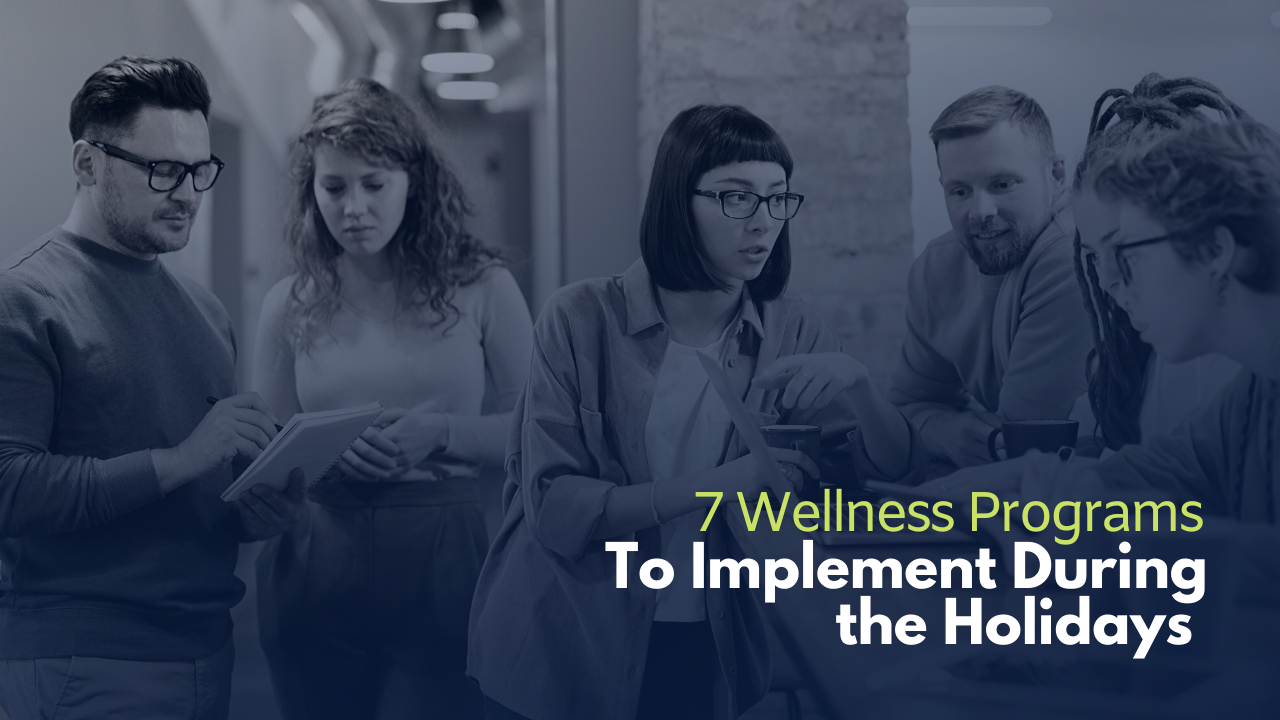- Though the holiday season brings plenty of reasons to be merry, it can be a particularly busy and stressful season for workers.
- From Thanksgiving to New Year, it can be hard to keep staff engaged and healthy as they juggle their workloads with holiday parties and buying gifts.
- From financial wellness to healthy eating and stress relief, here are 7 workplace wellness programs to help employees stay healthy during the holiday season.
Though the holiday season brings plenty of reasons to be merry, it can be a particularly busy and stressful season for workers. From Thanksgiving to New Year, it can be hard to keep staff engaged and healthy as they juggle their workloads, holiday parties, buying gifts, spending time with family, and fighting the winter blues. Stress levels are likely to go up while productivity goes down.
Though it might not seem like it, the holiday season can be a great time for companies to focus on workplace wellness to help workers maintain healthy habits during the holidays and provide mental health support to alleviate stress and prevent burnout.
7 Workplace Wellness Programs You Should Implement During the Holidays
1. Encourage people to eat healthily
During the holiday season, it can be hard for people to stick to a healthy and balanced diet. There tends to be extra food, extra drinks, extra snacks, extra desserts, extra everything. To help employees remain healthy, you should encourage them to eat healthily in the workplace.
Some ways to encourage this include hosting a healthy potluck, offering healthy snacks and beverages, hosting a weekly lunch for staff, or inviting a local chef to provide ideas on how to prepare healthier versions of holiday favorites.
Not only will healthy eating help people feel better physically (they won’t be over-stuffed), healthy eating can also prevent workers from feeling sluggish, therefore promoting productivity.
2. Provide stress relief
When people are stressed, they tend to be disengaged and out of focus. Not only does stress impact workplace performance, it also affects a person’s physical and mental health. Though companies should address workplace stress year-round, during the holiday season, companies might want to up their stress relief programs to prevent employee burnout.
Some ways to provide stress relief in the workplace include offering on-site massages, hosting yoga or meditation classes regularly, inviting experts to give stress management classes, and practicing mindfulness and deep breathing. Additional ways to help employees manage stress during the holidays include enabling flexible working hours, fostering a culture of gratitude, and allowing employees to work remotely (this last one can be particularly effective for workers who have family visiting them during the holidays).
3. Promote movement and activity
It’s not only difficult to maintain a healthy diet during the holidays, it can be just as difficult maintaining an exercise routine (people are more busy, the weather gets colder, schedules are disrupted by parties and events, etc.).
However, staying active during the holidays is extremely important. Regular exercise can reduce stress, increase energy, and help people maintain a healthy weight (or at least not gain any weight).
To encourage workers to stay active and mobile throughout the day, companies can organize a steps challenge, encourage people to take the stairs, take active breaks throughout the day where they encourage indoor exercise (5 minutes every hour where people do push-ups, sit-ups, planks, etc.), invite an expert to host a workout class (anything from yoga or zumba to boxing could work), and implement walking meetings.
4. Focus on financial health
Many people struggle with managing their finances and sticking to their budgets during the holidays. With increased parties, potlucks, and plenty of gifts to buy, many workers can feel overwhelmed and stressed by their financial situation.
Some ways to help employees deal with their financial wellbeing during the holidays include: if you’re hosting a secret santa, set a maximum budget for a gift; provide people with resources and tools that can help them improve their budgeting skills; and partner with local businesses that can offer employees discount codes or promotions.
Suggested Reading: Is It Possible to Achieve Financial Stability through Workplace Wellness Programs?
5. Encourage PTO and vacation time
Sometimes, what people really need during the holidays is a break, in order to recharge their batteries and alleviate stress. Encouraging workers to take their paid-time off or go on vacation can help promote work-life balance and positively impact a person’s wellbeing.
PTO or vacation time can be especially valuable for workers whose family is visiting (or they want to go visit family) and those who have children that are out on their winter break.
6. Focus on cleanliness and hygiene
Though not necessarily a workplace wellness program, companies should use this time to focus more on keeping the workplace clean. The holiday season is known for its merriness and cheer, but also for bringing with it germs and viruses.
Some ways to prevent sickness from spreading in the workplace include: encourage sick employees to stay at home (seriously!), keep hand sanitizer handy, ensure that your HVAC system is clean, encourage employees to receive the flu shot (this can be done by providing an extra long break for people to go and get it or host flu shots in the workplace), ensure the workplace is cleaned thoroughly every day, and provide tips on how to maintain a healthy immune system during the winter time.
7. Provide mental health support
While the holiday season is a time of cheer and happiness for many, it can be a time of sadness and loneliness for others — often due to family loss or family issues. Because of this, it’s important for companies to be mindful and aware of how the holiday season impacts each person differently and provide a support system for employees whose mental health might be affected.
Some ways to support the mental health of your employees during the holidays include promoting a culture of gratitude, organizing a volunteer opportunity for employees, provide access to resources and tools that can provide mental health support (access to professional health, digital apps, time off to cope), and promote a culture of openness and communication.



 Dr. Gleb Tsipursky – The Office Whisperer
Dr. Gleb Tsipursky – The Office Whisperer Nirit Cohen – WorkFutures
Nirit Cohen – WorkFutures Angela Howard – Culture Expert
Angela Howard – Culture Expert Drew Jones – Design & Innovation
Drew Jones – Design & Innovation Jonathan Price – CRE & Flex Expert
Jonathan Price – CRE & Flex Expert













